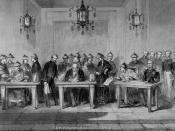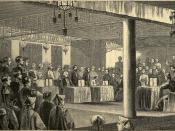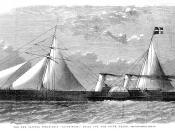Throughout her history and up until the early 19th century, China was ethnocentric, self-sufficient and didn't need to import products from the Western countries (O'Brien & Encyclopædia Britannica). However, with the introduction of the illegal opium trade, China became the area for conquests for many countries from Europe Asia and the United States. For countries such as Great Britain, the opium trade was a mean of establishing imperialism in China, through first making China go against her isolation policies in trade with the Western nations, and then directing China into wars that would lead to China's division into "spheres of influence" and the Open Door Policy.
There was an obvious imbalance in trade between the Western Nations and China. Chinese products such as tea, silks, and porcelain pottery were strongly demanded in Europe, while the products manufactured in Europe had low value for the Chinese. The Chinese traded these goods for silver and gold, making the trading conditions not profitable for the Europeans.
Therefore when the British discovered the benefits of the opium trade established by the Portuguese in China, they came up with new methods of quick and cheap cultivation of opium poppies in Bengal, an Indian province controlled by the British (Encyclopædia Britannica & O'Brien). British smugglers were now illegally importing opium into the country, taking advantage of the progress of the drug addiction. According to the China Year Book of 1916 ""The poppy has been known in China for 12 centuries, and its medicinal use for 9 centuries. . . . The importation, however, continued to increase, and by 1790 it amounted to over 4,000 chests annually. In 1796 opium smoking was again prohibited, and in 1800 the importation of foreign opium was again declared illegal. Opium was now contraband, but the fact had no effect on...


